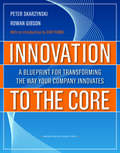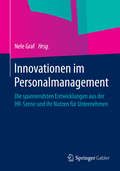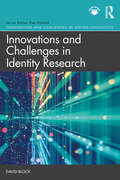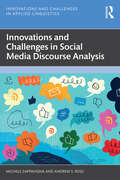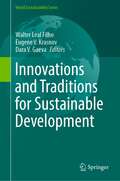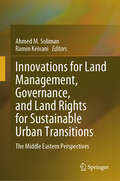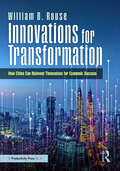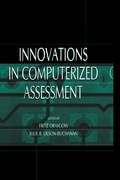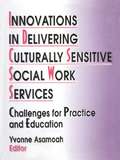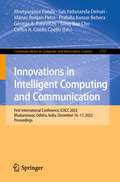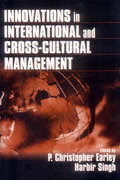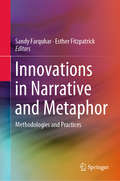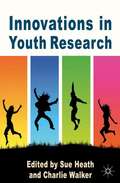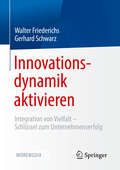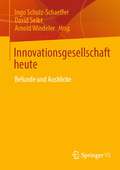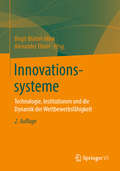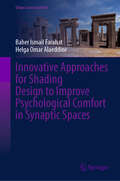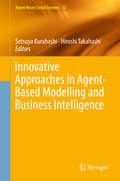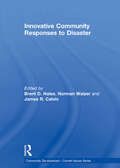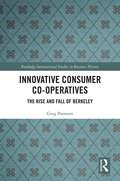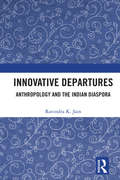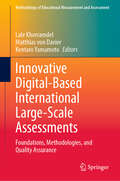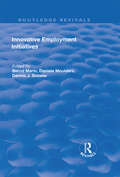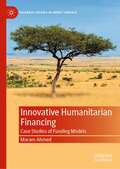- Table View
- List View
Innovation to the Core
by Rowan Gibson Peter SkarzynskiIf you're like most business leaders, innovation now tops your corporate agenda. But despite all the talk and excitement about the importance of innovation, managers have so far found scant help for innovating in a systematic way that fuels consistent growth and sustained success.In Innovation to the Core, Strategos CEO Peter Skarzynski and business strategist Rowan Gibson change all that. They share the accumulated wisdom from Strategos--the consulting firm Skarzynski co-founded with Gary Hamel that helps clients instill innovation into their very core. Drawing on a wealth of stories and examples, the book shows how companies of every stripe have overcome the barriers to successful, profitable innovation. You'll find parts devoted to crucial topics--such as how to organize the discovery process, generate strategic insights, enlarge your innovation pipeline, and maximize your return on innovation. Frequent hands-on tools--frameworks, checklists, probing questions--help you put the book's ideas into action.Crafted in close coordination with Gary Hamel--the man who Fortune magazine has called "the world's leading expert on business strategy"--Innovation to the Core is the definitive fieldbook for making innovation a core competence in your organization.
Innovationen im Personalmanagement: Die spannendsten Entwicklungen aus der HR-Szene und ihr Nutzen für Unternehmen
by Nele GrafDieses Werk stellt erstmals herausragende und ungewöhnliche Innovationen im Personalmanagement vor. Verantwortliche im Bereich Human Resources müssen immer kreativer werden, um die an sie gestellten Anforderungen zu erfüllen und sich als strategischer Partner zu positionieren. Daher ist es notwendig, über neue Entwicklungen im Recruiting, der Personalentwicklung und dem HR-Management allgemein auf dem Laufenden zu bleiben und Relevantes umzusetzen. Personalverantwortliche, Geschäftsführer, Berater, Studenten und Start-Ups erfahren, was sich im Personalmanagement tut und wie sie die neuen Entwicklungen für sich nutzen können.
Innovations and Challenges in Identity Research (Innovations and Challenges in Applied Linguistics)
by David BlockInnovations and Challenges in Identity Research examines established and emergent issues within identity research. This innovative book adopts a disciplinary transcendent approach, drawing on a range of social science, humanities and human science disciplines on the way to a detailed consideration of: the history of identity as a construct the components of a poststructuralist/social constructivist approach to identity the prospect of a Marxist political economy approach to identity the interrelationship between structure and agency and a model of structuring spheres an expanded version of positioning theory the digital universe as the future of identity research. Leading researcher David Block provides a personal take on this key topic of study in applied linguistics and explains why and how discourse analysis is still a useful means through which we can understand identity today. The book is essential reading for students and academics studying and researching within the area of language and identity.
Innovations and Challenges in Social Media Discourse Analysis (Innovations and Challenges in Applied Linguistics)
by Michele Zappavigna Andrew S. RossInnovations and Challenges in Social Media Discourse Analysis provides a key introduction to the analysis of everyday discourse on social media platforms.Outlining the challenges involved in the study of social media discourse that includes social interaction, relationality, intersubjectivity, and intermodality, this book takes a social semiotic approach to offer a useful reconceptualisation of existing tools and introduces new methodologies to help those studying in this area.Drawing on a range of corpora that feature tweets, Instagram photos, YouTube comments, and emoji, this book is essential reading for students studying modules on discourse analysis and language and media.
Innovations and Traditions for Sustainable Development (World Sustainability Series)
by Walter Leal Filho Eugene V. Krasnov Dara V. GaevaThis book highlights the vital necessity for combining sustainable development processes from different areas, with applications in areas such as science, education and production sectors. These sectors have previously been separated by linguistic and technological barriers. Breaking down these barriers will allow an interdisciplinary and transdisciplinary flow of information, leading to greater efficiency, and towards a more real resilient and sustainable economy development. This book fills in the gap in respect of publications addressing aspects of innovation and sustainable development and focuses on a range of areas, such as I. Gradual transition to innovative development; II. Continuity of technology in education, science and industry; III. Convergency directions, interdisciplinary relations in scientific research; IV. Digital technologies for sustainable development; V. Global trends and regional aspects of innovation and traditions in environmental management; VI. International legal regulations and environmental and economic relations among business communities. The publication fosters the global efforts towards taking better advantage of the many opportunities which innovation in specific areas may offer.
Innovations for Land Management, Governance, and Land Rights for Sustainable Urban Transitions: The Middle Eastern Perspectives
by Ramin Keivani Ahmed M. SolimanThe transformation of the built environment during the last few decades has placed enormous demands for land. About 7.7 billion people live on the planet, which is expected to increase by 2.5-3.0 billion in just 30 years, with the highest growth projected to be in less developed regions. The spreading of urban informality in cities of the Global South leads to chaotic informal economies and an inability to capitalize on urban-rural economies of scale and exchange. The combination of socioeconomic and climate change vulnerability in urban centres is having a “double impact” on already poverty-stricken and marginalized groups (especially women, racialized, and ethnic minority groups) – leading to what has come to be known as “climate injustice”. Land constitutes a main component of urban development and is the main asset for informal urban communities in the Middle East region. The State and urban planners can aim to regulate the growth of informal land markets or represent the interests of the citizens. However, in reality the increasing retreat or absence of the public authorities, the crisis of confidence between the governed and governing, and the deficit of urban policies to address the multitude of generated challenges cannot be concealed. This volume examines three main themes: land management and governance in the era of sustainability; Legal, informal, and illegal land tenures; and the broader socioeconomic changes impacting land (and housing) delivery. It investigates the correlations, transitions, and interactions between the various forces and multi-stakeholders that control and adjust the land delivery system for low-income groups and the urban poor. This includes exploring mechanisms for correcting urban inequalities between central and peripheral quarters and the modes of shared governance. Finally, the volume also discusses developing national land policies based on legal instruments that connect the implementation of the SDGs, land, and tenure security as critical drivers for more sustainable land delivery realization.
Innovations for Transformation: How Cities Can Reinvent Themselves for Economic Success
by William B. RouseThis book chronicles how four resort cities (Asheville, Aspen, Key West and Laguna Beach) addressed failing economic situations to reinvent themselves and prosper. The author explores bottom-up reinventions of local community value propositions, often driven by economic forces that require reinvention due to declining or disappearing traditional economic opportunities. The author foregoes broad national policies and focuses on a wide range of citizen groups, local institutions and businesses that coalesce to understand what is happening or has happened to their community. These cities then formulate future aspirations with new value propositions and experiment to determine what works. The investment becomes focused on emergent successes. The book addresses four community ecosystems and a spectrum of contexts—For example, mountains vs. oceans and venues for entertainment vs. thought leadership. These four ecosystems were reinvented creatively to enable great economic and societal successes. In particular, the energy provided by bottom-up innovation was crucial. The information presented in this book is drawn from two sources—First, historical accounts of such initiatives are leveraged. Second, and more substantial are findings synthesized from extensive interviews in Asheville, NC.
Innovations in Computerized Assessment
by Fritz Drasgow Julie B. Olson-BuchananComputerized assessment offers many opportunities for innovations in measurement. In contrast to static paper-and-pencil instruments, computerized assessment can capitalize on the dynamic capabilities of the computer. For example, the difficulty of administered items can be adopted to the ability of the examinee, thus eliminating items that are too hard or too easy. Multimedia computers provide the opportunity to revolutionize assessment. Stereo sound, animation, and full-motion video can be incorporated into assessment tools and aid in the measurement of individual differences ranging from musical skills to interpersonal abilities. Innovations in Computerized Assessment presents the experiences of leading researchers in computerized assessment. The book places particular emphasis on the dilemmas that were faced by the researchers. Questions addressed include: * What problems did they confront? * What were the pros and cons of various options? * How were dilemmas resolved? * Were the solutions good ones?
Innovations in Delivering Culturally Sensitive Social Work Services: Challenges for Practice and Education
by Yvonne AsamoahInnovations in Delivering Culturally Sensitive Social Work Services: Challenges for Practice and Education is for human service professionals and educators who are seeking innovative ways to make their practice and service delivery more culturally appropriate and their education and training more relevant. As Editor Yvonne Asamoah explains, “There has never been a more critical time for social work practitioners, educators, and policy makers to critique their programs, service delivery systems, and curricula for cultural relevance. Apart from federal and state mandates which require agencies to demonstrate how they are preparing workers to deliver culturally sensitive services, demographic shifts and increasing economic hardships are continually producing a more diverse clientele in need of service. . . . Being sensitive to the needs of the local community and the subtle, but significant, ethnic differences within them is critical and has important implications for training, policy, and practice.”The contributors describe actual models put into practice in the U.S. and Canada--analyzing the results and debating the issues of diversity and cultural sensitivity in regard to the social work profession. Innovations in Delivering Culturally Sensitive Social Work Services gives you an inside look at different approaches, programs, and studies, including: an innovative demonstration project designed to deliver social services to people from different cultures in Canada an eight-step communication process model that social work agency supervisors and training units may use to help workers become more effective multicultural practitioners a study on the incidents of misunderstanding between social workers from a Western-oriented society and those from a non-Western society in terms of culture shock the results of a statewide survey in Nevada on attitudes of social workers in relation to diversity, using a modified Multicultural Counseling Inventory to measure awareness, knowledge, and skills the four major multicultural issues considered critical to the delivery of health and mental health, and preventative and treatment services to Latino clients an examination of the issue of diversity in the workplace using the university and schools of social work as examplesOther important contributions in Innovations in Delivering Culturally Sensitive Social Work Services include a unique look at the topic of cultural diversity and sensitivity from a management perspective--introducing you to the concept of the ‘globally aware’social work manager. Practical suggestions to assist you in achieving global awareness are provided through a “Global Problem Analysis Worksheet” including issues of staffing, hiring and retention of foreign born staff; service planning and organization to meet the needs of immigrants, refugees, and other international populations; staff development; and broader organizational concerns of information systems and policymaking. Two other chapters directly relate to the critical issues raised by Paige in his comprehensive 1986 work on cross-cultural orientation and applications. These chapters will help you view your own cross-cultural encounters with both clients and peers in a broader, theoretical context.
Innovations in Intelligent Computing and Communication: First International Conference, ICIICC 2022, Bhubaneswar, Odisha, India, December 16-17, 2022, Proceedings (Communications in Computer and Information Science #1737)
by George A. Tsihrintzis Satchidananda Dehuri Mrutyunjaya Panda Carlos A. Coello Coello Manas Ranjan Patra Sung-Bae Cho Prafulla Kumar BeheraThis book contains the papers presented at the First International Conference on Innovations in Intelligent Computing and Communication, ICIICC 2021, held in Bhubaneswar, Odisha, India, in December, 2022. The 31 full papers presented were thoroughly reviewed and selected from 78 submissions. They are divided in three tracks with the following topics: Intelligent Computing; Communications; and Machine Learning and Data Analytics.
Innovations in International and Cross-Cultural Management
by P. Christopher Earley Harbir SinghPresenting cross-cultural research on a wide range of organizational topics, this book ranges from the individual to the macro level. Among the issues examined are: organizational trust in international settings, HRM issues in international joint ventures, developing strategic advantage across borders, and social partnerships for sustainable growth.
Innovations in Narrative and Metaphor: Methodologies and Practices
by Sandy Farquhar Esther FitzpatrickThis book pursues an interdisciplinary approach to open a discourse on innovative methodologies and practices associated with narrative and metaphor. Scholars from diverse fields in the humanities and social sciences report on how they use narrative and/or metaphor in their scholarship/research to arrive at new ways of seeing, thinking about and acting in the world. The book provides a range of methodological chapters for academics and practitioners alike. Each chapter discusses various aspects of the author’s transformative methodologies and practices and how they contribute to the lives of others in their field. In this regard, the authors address traditional disciplines such as history and geography, as well as professional practices such as counselling, teaching and community work.
Innovations in Youth Research
by Sue Heath Charlie WalkerThis book explores and celebrates imaginative and creative approaches to youth research, showcasing a wide range of innovative methods including music elicitation, mental mapping, blog analysis and mobile methods.
Innovationsdynamik aktivieren: Integration von Vielfalt - Schlüssel zum Unternehmenserfolg
by Gerhard Schwarz Walter FriederichsIn diesem Buch wird beschrieben wie Innovationsdynamik aktiviert wird. Am Beispiel des traditionellen Executive Onboarding wird gezeigt, dass der Fokus auf Anpassung des neuen Organisationsmitglieds an die bestehenden Regeln Innovationspotential vernichtet. Das steht im Widerspruch zu der Notwendigkeit, sich im Zuge der zunehmenden Komplexität auf unvorhergesehene Veränderungen in kürzester Zeit einzustellen. Durch die Integration neuer Perspektiven können Unternehmen eine Dynamik entwickeln, die den schnellen Veränderungen gewachsen ist. Dafür müssen Teams in heterogener Zusammensetzung funktionsfähig werden und neue Perspektiven so integrieren, dass sie Teil ihrer Teamidentität werden. Das leisten wir durch Überwinden emotionaler und sozialer Barrieren gegen Neues.
Innovationsgesellschaft heute: Befunde und Ausblicke
by Ingo Schulz-Schaeffer Arnold Windeler David SeibtDer Band setzt es sich zum Ziel, zentrale Ergebnisse des Graduiertenkollegs Innovationsgesellschft heute zu sammeln und in Hinblick auf dessen übergreifende theoretische Ansätze, empirische Gegenstände und gesellschaftlich relevante Fragestellungen zu reflektieren. Was haben wir über die Strukturen und Dynamiken der Innovationsgesellschaft gelernt und wie haben sich diese über den Forschungszeitraum weiterentwickelt? Wie konstituieren sich Innovationsfelder und andere innovationsbezogene Mesoordnungen und welche Gemeinsamkeiten und Unterschiede lassen sich zwischen ihnen feststellen? Welche neuen Praktiken reflexiver Innovation bilden sich heraus und welche Steuerungsprobleme, unintendierte Nebenfolgen und Gegenbewegungen sind mit ihnen verbunden? In welchem Verhältnis steht Innovation zu etablierten Strukturen, feldspezifischen Materialitäten und gesellschaftsweiten Entwicklungen wie etwa der Digitalisierung? Welche Rolle spielen gesellschaftliche Krisen bei der Hervorbringung und Durchsetzung von Innovationen?
Innovationssysteme: Technologie, Institutionen und die Dynamik der Wettbewerbsfähigkeit
by Birgit Blättel-Mink Alexander EbnerDer vorliegende Sammelband ist in drei thematische Blöcke gegliedert. Der erste Block enthält deutsche Übersetzungen von Grundlagentexten des Innovationssysteme-Ansatzes. Im zweiten Block werden einzelne theoretische Aspekte vertiefend analysiert. Der dritte Block enthält Studien zur Ausdifferenzierung des deutschen Innovationssystems. Innovationen entstehen im Kontext interaktiver Lernprozesse systemisch vernetzter Akteure. Im Zentrum strukturell und institutionell eingebetteter Innovationsnetzwerke, die an der Generierung und Diffusion von Innovationen beteiligt sind, stehen private Wirtschaftsunternehmen. Sie kooperieren in ihren Forschungsaktivitäten vorrangig mit öffentlichen und privaten Forschungseinrichtungen, Bildungs- und Ausbildungseinrichtungen sowie mit Finanzdienstleistern. Historisch betrachtet sind Innovationssysteme zunächst auf nationalstaatlicher Ebene entstanden. Die Globalisierung, aber auch neue technologische Regimes führen zur Ausdifferenzierung lokaler, regionaler und supranationaler, sowie branchenspezifischer Arrangements.
Innovative Approaches for Shading Design to Improve Psychological Comfort in Synaptic Spaces (Urban Sustainability)
by Baher Ismail Farahat Helga Omar AlaeddineThis book explores how innovative shading design improves psychological comfort in synaptic spaces – those dynamic and transitional built environments where people connect, engage, and interact. Bridging architecture, environmental psychology, and neuroarchitecture, it proposes efficient cutting-edge strategies to create responsive and flexible environments. It examines shading as a powerful design tool that transcends function to shape psychological experience, sensory balance and spatial identity. Through interdisciplinary research and case-based analysis, the book offers valuable practical guidance for architects, urban designers, and researchers seeking to create human-centered environments that foster well-being and enhance the quality of lived spaces through thoughtful design.
Innovative Approaches in Agent-Based Modelling and Business Intelligence (Agent-Based Social Systems #12)
by Setsuya Kurahashi Hiroshi TakahashiThis book thoroughly prepares intermediate-level readers for research in social science, organization studies, economics, finance, marketing science, and business science as complex adaptive systems. It presents the advantages of social simulation studies and business intelligence to those who are not familiar with the computational research approach, and offers experienced modelers various instructive examples of using agent-based modeling and business intelligence approaches to inspire their own work. In addition, the book discusses cutting-edge techniques for complex adaptive systems using their applications.To date, business science studies have focused only on data science and analyses of business problems. However, using these studies to enhance the capabilities of conventional techniques in the fields has not been investigated adequately. This book addresses managing the issues of societies, firms, and organizations to profit from interaction with agent-based modeling, human- and computer- mixed systems, and business intelligence approaches, an area that is fundamental for complex but bounded rational business environments.With detailed research by leading authors in the field, Innovative Approaches in Agent-Based Modelling and Business Intelligence inspires readers to join with other disciplines and extend the scope of the book with their own unique contributions. It also includes the common challenges encountered in computational social science and business science to enable researchers, students, and professionals to resolve their own problems.
Innovative Community Responses to Disaster (Community Development – Current Issues Series)
by Brent D. Hales, Norman Walzer and James R. CalvinIncreasingly, community leaders around the world face major natural and economic disasters that require them to find ways to rebuild both physical infrastructure and the local economy. Doing this effectively requires an understanding of how various parts of the community are interconnected, as well as information as to which revitalization approaches have succeeded in the past. Community investment in recovery is essential and, in some cases, may require local leaders to rethink how it can be financed and arranged. This book presents a conceptual framework based on the community capitals, and describes approaches that have succeeded in situations where local leaders have coordinated efforts to rebuild and revitalize local conditions. Contributions provide examples of successful approaches around the world, thus analysing potential strategies for addressing disasters of many different types in various cultural settings. In this way, the book provides insights into a variety of approaches based on applications of accepted community development theory and concepts. This book was originally published as a special issue of Community Development.
Innovative Consumer Co-operatives: The Rise and Fall of Berkeley (Routledge International Studies in Business History)
by Greg PatmoreConsumer co-operatives provide a different approach to organizing business through their ideals of member ownership and democratic practice. Every co-operative member has an equal vote regardless of his or her own personal capital investment. The co-operative movement can also be an important force in promoting development and self-sufficiency in poorer areas, particularly in non-industrialised countries. This book explores in depth the fortunes of the Berkeley Consumer Co-operative, which became the largest consumer co-operative in the United States with 116,000 members in 1984 and viewed nationally as a leader in innovative retail practices and a champion of consumer rights. The Berkeley Consumer Co-operative is promoted by both supporters and opponents of the co-operative business model as a significant example of what can go wrong with the co-operatives. This book will provide the first in depth analysis of the history of the Berkeley Co-operative using its substantial but little used archives and oral histories to explore what the Berkeley experience means for the co-operative business model. The specific chapters relating to Berkeley will be organised around particular themes to highlight the issues relating to the co-operative business model and the local context of Berkeley. The themes relate to developments in Berkeley and the Bay Area in terms of the economy, politics and the retail environment; the management of the Berkeley co-operative, looking at governance, financial management and strategic decisions; relationship of management with members and employees; and finally, the relationship of the Berkeley Co-operative with the community. The core message of the book is that it is not inevitable that consumer co-operatives fail, but that the story of Berkeley story can provide insights that can strengthen the co-operative business model and minimise failures on the scale of Berkeley occurring in the future.
Innovative Departures: Anthropology and the Indian Diaspora
by Ravindra K. JainThis volume brings together analytical insights from modern social and cultural anthropology to unravel processes of globalization in the 21st century through diasporic migrations. Developments in anthropological theory and method are traced from the heritage of Enlightenment to the present times, with special reference to India. While firmly anchored in the local experience, the narrative of diasporic migrations presented in this book ranges widely to cover comparisons across the world and is informed by an interdisciplinary focus. The author deals with the issues of ethnicity, identity and modernity in a transnational and geopolitical context. The innovative and multi-dimensional thrust encompasses major themes and research methodology. The work includes important case studies and a detailed empirical exploration of the multicultural societies of Malaysia and South Africa. Authoritative and accessible, this book will be essential reading in contemporary anthropology, especially for scholars and researchers of sociology, social and cultural anthropology, diaspora and migration studies, ethnic studies and cultural studies as also international relations, foreign affairs, public policy, think-tanks and government bodies.
Innovative Digital-Based International Large-Scale Assessments: Foundations, Methodologies, and Quality Assurance (Methodology of Educational Measurement and Assessment)
by Matthias Von Davier Kentaro Yamamoto Lale KhorramdelThis edited volume provides a comprehensive overview of the technology-driven innovations that have transformed National and International Large-Scale Assessments over the past decade, along with the research and considerations that have accompanied these changes. It documents the groundwork for ongoing innovations and explores future directions as these assessments continue to evolve. While the impact of technology on education and assessments is difficult to predict, best practices and emerging principles for transitioning from paper-based to digital formats can be described. The volume offers guidelines and examples from experts who have transitioned assessments like PISA, PIAAC, TIMSS, PIRLS, and NAEP into the digital era. It also highlights research on digital-based assessments, showcasing new insights from log file and process data, as well as innovative domains.
Innovative Employment Initiatives (Routledge Revivals)
by Bernd MarinThis title was first published in 2000. The result of an international meeting organized by the European Centre, this book reports from economists, social scientists and experts from government and inter-governmental institutions who came together to investigate the best way to overcome mass unemployment in Europe.
Innovative Humanitarian Financing: Case Studies of Funding Models (Palgrave Studies in Impact Finance)
by Maram AhmedHumanitarian crises have become more frequent, complex and protracted. If current trends continue, it is estimated that by 2030, humanitarian assistance costs could increase to $50 billion per year. By then, two-thirds of the world’s poor are at risk of living in conflict-affected countries. To bridge the gap, humanitarian organizations are increasingly utilizing innovative financing tools such as impact bonds, faith-based finance and other innovative financial products and services to mobilize greater funding to address humanitarian needs. This book is among the first to assess a set of innovative financing mechanisms that have been transforming the humanitarian sector and explores their key opportunities, challenges and future prospects. This book will be of interest to academics, practitioners, humanitarian organizations and policy makers involved in humanitarian financing and to the humanitarian sector in general.
Innovative Intelligent Industrial Production and Logistics: 4th International Conference, IN4PL 2023, Rome, Italy, November 15–17, 2023, Proceedings (Communications in Computer and Information Science #1886)
by Oleg Gusikhin Kurosh Madani Hervé Panetto Sergio TerziThis book constitutes the proceedings of the 4th International Conference, IN4PL 2023, held in Rome, Italy, during November 15-17, 2023The 11 full papers and the 13 short papers included in this volume were carefully reviewed and selected from 33 submissions. The book focuses on research and development involving innovative methods, software and hardware, whereby intelligent systems are applied to industrial production and logistics. This is currently related to the concept of industry 4.0 - an expression reflecting the trend towards automation and data exchange in manufacturing technologies and processes which include cyber-physical systems, the industrial internet of things, industrial robotics, cloud computing, cognitive computing and artificial intelligence.
